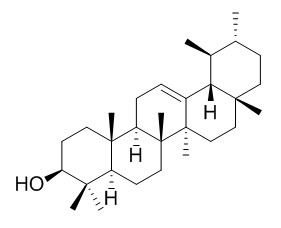alpha-Amyrin
Alpha-Amyrin is trypsin and chymotrypsin inhibitor,it has antineoplastic,it induces proliferation of human keratinocytes.Alpha-Amyrin can as a hepatomodulatory potent to feasibility for a promising liver curative drug.
Inquire / Order:
manager@chemfaces.com
Technical Inquiries:
service@chemfaces.com
Tel:
+86-27-84237783
Fax:
+86-27-84254680
Address:
1 Building, No. 83, CheCheng Rd., Wuhan Economic and Technological Development Zone, Wuhan, Hubei 430056, PRC
Providing storage is as stated on the product vial and the vial is kept tightly sealed, the product can be stored for up to
24 months(2-8C).
Wherever possible, you should prepare and use solutions on the same day. However, if you need to make up stock solutions in advance, we recommend that you store the solution as aliquots in tightly sealed vials at -20C. Generally, these will be useable for up to two weeks. Before use, and prior to opening the vial we recommend that you allow your product to equilibrate to room temperature for at least 1 hour.
Need more advice on solubility, usage and handling? Please email to: service@chemfaces.com
The packaging of the product may have turned upside down during transportation, resulting in the natural compounds adhering to the neck or cap of the vial. take the vial out of its packaging and gently shake to let the compounds fall to the bottom of the vial. for liquid products, centrifuge at 200-500 RPM to gather the liquid at the bottom of the vial. try to avoid loss or contamination during handling.
Nutrients.2019, 12(1)
J Nat Prod.2021, 84(9):2544-2553.
Ind. J. Pharm. Edu. Res.2023; 57(3):1132-1139.
Kor.J.Herbol.2024, 39(3):23-35
J Ethnopharmacol.2020, 249:112381
Mol Neurobiol.2021, 58(8):3665-3676.
Pharmaceutics.2022, 14(3):564.
J Cell Mol Med.2022, 26(23):5807-5819.
Molecules.2022, 27(7):2116.
Biomedicine & Pharmacotherapy2022, 153:113404.
Related and Featured Products
Acta Biochim Pol. 2012;59(2):255-60.
Triterpenoid α-amyrin stimulates proliferation of human keratinocytes but does not protect them against UVB damage.[Pubmed:
22577623]
Rhaponticum carthamoides plants ("maral root") are widely used in Siberian folk medicine. The present study reports for the first time the presence of pentacyclic terpenoid, alpha-Amyrin, in methanol extract from leaves of this plant.
METHODS AND RESULTS:
alpha-Amyrin induced proliferation of human keratinocytes (HaCaT) by about 18% while other extract components were ineffective. A panel of biochemical and cell-based assays testing the antioxidative and cytoprotective activites of alpha-Amyrin indicated no antioxidative activity of this compound.
CONCLUSIONS:
alpha-Amyrin did not protect HaCaT cells against the damage caused by UVB radiation.
J Ethnopharmacol. 2015 Feb 23;161:186-93.
Modulatory potential of α-amyrin against hepatic oxidative stress through antioxidant status in Wistar albino rats.[Pubmed:
25542388]
alpha-Amyrin (a pentacyclic triterpene widely distributed in nature and isolated from a variety of plant sources and pharmacologically shown a wide spectrum of activity including anti-inflammatory, anti-ulcer, anti-hyperlipidemic, anti-tumor, and hepatoprotective actions) explored as hepatomodulator from the ethanol extract of the stem bark of Alstonia scholaris Linn.
METHODS AND RESULTS:
Experimental rats, hepato-oxidatively stressed by CCl4 (0.2 ml/kg b wt/twice a week, intra-peritoneally), were concurrently received alpha-Amyrin (20mg/kg body weight/day, orally) for 30 consecutive days. The assessment of all biochemical parameters registered a significant (P<0.001) hepatic oxidative stress in CCl4 treated rats, which was considerably recovered near to almost normal level in rats co-administered with alpha-Amyrin at the dose level of 20mg/kg body weight/day for 30 consecutive days. The histoarchitectural examination of liver sections from treated groups further corroborated the hepatomodulatory potential of alpha-Amyrin and compared with standard drug-silymarin.
CONCLUSIONS:
These findings indicate that the modulatory potential of alpha-Amyrin against hepatic oxidative stress possibly involve mechanism related to its ability to block the P-450 mediated CCl4 bioactivation through selective inhibitors of ROS (reactive oxygen species) as antioxidants brought about significant inhibition of the formation of LPO suggesting possible involvement of O2(●-), HO2, HO2(●-), H2O2 and •OH. Therefore this study suggests that the use of alpha-Amyrin as a hepatomodulatory potent to feasibility for a promising liver curative drug.



